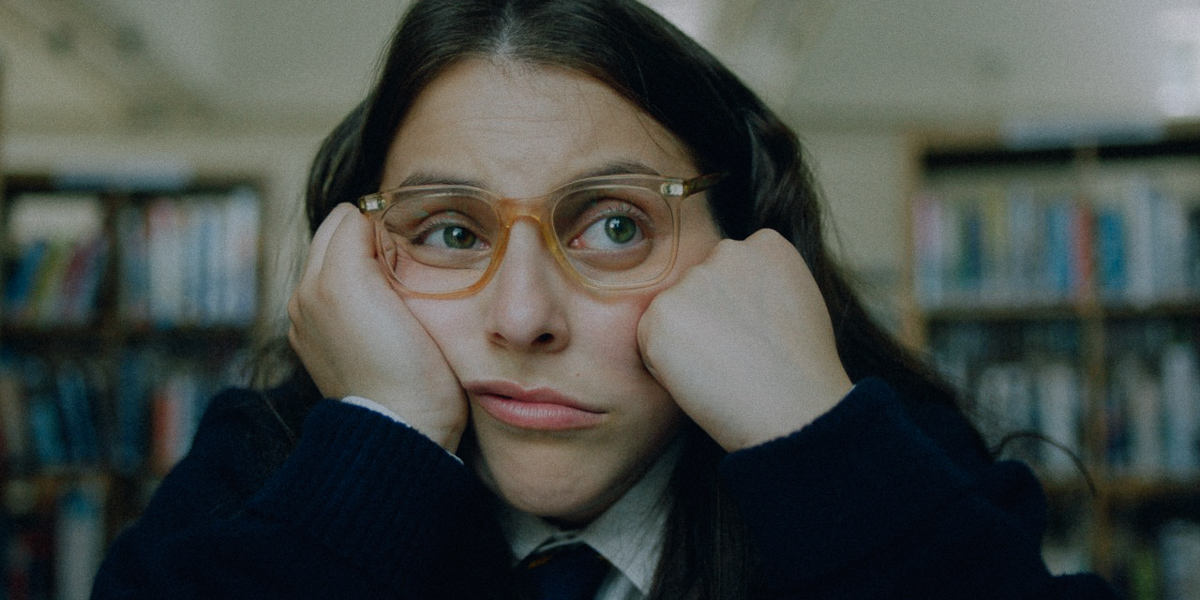As a young girl with aspirations to write, journalist Caitlin Moran used her hippie homeschool upbringing to enter literary competitions with potential to open industry doors. The Observer’s “Young Reporter of the Year” at fifteen eventually started her professional career the following year with Melody Maker and never looked back. Did she devolve into the nom de plume Dolly Wild to gleefully trash bands as DM&E’s resident rock gatekeeper extraordinaire? No. But you have to imagine the opportunity to go that route was available. The financial appeal must have been great too at age sixteen because the type of comedic trolling a good writer can perform is exactly what gets global audiences in a frenzy (see social media). So she did the next best thing and imagined it instead.
The result was the first installment of a planned trilogy entitled How to Build a Girl. At its center is young Joanna Morrigan—an over-achieving aspiring poet with pictures of her heroes (Sylvia Plath, Elizabeth Taylor, and the Brontes) adorning her wall as vessels with which to bestow wisdom. She finds the courage to put herself out there despite the persistent mocking of bullies declaring her uncool, talks her way into a job reviewing modern music (of which she knows nothing), and eventually arrives at a crossroads where being the effervescent lover of life that disarms talent in a cynical industry proves unable to move magazines as readily as catty teardowns composed of interchangeable insults regardless of whether she believes them to be true. Joanna readily embraces the latter.
Adapted by Moran and John Niven with direction from Coky Giedroyc, the film version allows us to watch as the endearing Joanna (Beanie Feldstein) confronts this choice of selling out that we’ve all been forced to make. Besides the character being a riot to watch on her own, the intriguing commentary born from her age can’t help rise above. This is a teenager finding her voice in an adult world before she could in school. A young woman entering a wolf’s den of chauvinism and sexual harassment before she’s ever really thought about sex outside the fantasy of hot boys through the library window. She becomes a victim to impossible expectations her enthusiasm can’t quite carry alone. A thirst for that unfulfilled success soon impacts her germinating identity.
Who she wants to be is, however, enough for her delusional wannabe rocker father (a great Paddy Considine), her now worn down mother after surprise twins restart the infant grind (Sarah Solemani), and her empathetic brother Krissi (Laurie Kynaston)—the sole person her age who treats her as an equal. They inspire her to find the courage to match her confident writing and prove her worth. While Joanna’s unique perspective and humor do exactly that to make her reviews a regular part of the magazine that didn’t want her, effusive praise doesn’t quite transfer to features when a John Kite (Alfie Allen) profile can’t get past the editor’s claims of “fangirl fawning.” She can either own that label or pivot the Dolly Wild persona straight into mean-spirited bitch.
Feldstein is a delight as Joanna. She never breaks from the British accent and her nerd’s shift from wittily-edged inner monologues to razor-sharp verbal eviscerations delivered in-person as Dolly is scarily seamless. We’re literally watching a potential valedictorian candidate turn to the dark side for money and infamy and we almost can’t blame the choice considering her family’s economic state. You get that taste of the good life, spread the wealth with those you love, and eventually realize you don’t like who you’ve become. But going back to the way things were isn’t as easy as flipping a switch. Most times it’s only possible as the result of devastating truths and rock bottom faceplants. And in the end there’s absolutely nobody to blame but yourself.
The film is thus rife with mirrors whether it’s Krissi having access to the “cool” room at school before watching Joanna lock him out or the contrast between Kite’s kind-hearted love interest as platonic confidant and one of her bosses (Frank Dillane) making good on the “jailbait” status he gave her. Does she stand-by the father who supports her as easily as breathe or throw him under the bus if the reward is career advancement? Constantly pitting Joanna against Dolly ensures we never forget that one became the other. She might tell herself that Ms. Wild was always inside, but we know better. Heck, even those aforementioned heroes (played Jameela Jamil, Michael Sheen, Lucy Punch, and other familiar Brits) on her wall know when to protest her metamorphosis.
Moran has pretty much written this story as a 90s-set parable for grown-ups where Joanna is always learning a new lesson (often after ignoring it first). How she creates her comedy around subjects like sexual harassment and feminism is effective too because she never diminishes the impact of what’s occurred. When an editor asks Joanna to sit on his lap, she doesn’t just throw it back in his face for a smile. She turns that table right around, delivers a lesson of her own that he literally doesn’t forget, and earns the laugh to boot. So even though the whole can feel a bit cutesy at times, there’s real weight beneath that façade. Joanna discovers the real-life consequences of her actions and hopefully some watching will too.
How to Build a Girl premiered at the Toronto International Film Festival.

